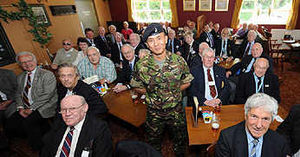Tradition and pride of Gurkhas
Staffordshire-based sergeant Ishwor Gurung spoke with pride about the fighting tradition of the Gurkhas at a special event held at RAF Cosford, near Wolverhampton.

The 30-year-old Nepalese warrior, who lives in Cosford with wife Manju, 25, followed his father and grandfather into the British Army and has just returned from Afghanistan where a fellow countryman was among four British troops killed last week. Sgt Gurung described his military experiences to the Cosford branch of the National Service RAF Association.
It came as the row continued over the right of all Gurkhas who served in the British Army to settle in this country.
Sgt Gurung, whose brother Gopal, 28 is also in the army, told the Express & Star: "I have been very moved by the reaction of the British people and the response I have just received was overwhelming.
"The Gurkha veterans did a brilliant job when they served in the British Army. They created a tremendous tradition in which Gurkha soldiers have a reputation for being brave and not taking a backward step.
"They are the reason we are here now. I do not think that there would be Gurkha squadrons in the British Army if it had not been for their immense contribution.
"There is a tremendous tradition that we try to live up to. Gurkha soldiers have a reputation. It is better to die a hero.
"Sir Ralph Turner famously said of the Gurkhas: 'They are the bravest of the brave, the most generous of the generous and no country has had more faithful friends than them.' It is quite a reputation to attempt to uphold."
The mountain kingdom of Nepal is less than half the size of England but has provided some of the most fierce and respected soldiers in the British Army for almost 200 years, with 3,498 currently serving.
They won 10 Victoria Crosses in the Second World War and two in the Great War. Up to 25,000 young men aged between 17 and 21 contest the 230 places reserved for them each year.
They must be at least 5ft 3in tall, weigh more than 50kg and face gruelling tests of brain and brawn that include carrying 25 kilos of stones in a basket up a 3.5k hill in under 14 minutes, but the rewards are worth the effort – the average income in Nepal is £300-a-year compared to a starting salary in the British Army of at least £16,500.
The lucky few then start nine months training at Catterick before being granted full admission to the British Army. Unsurprisingly, no Gurkha has ever failed this final trial.
Sgt Gurung said: "The day I was chosen was one of the happiest of my life. There had been a lot of pressure on me to succeed."
His grandfather was a private in the Indian Gurkha army and his father reached the rank of sergeant in the 7th Gurkha Rifles. Sgt Gurung, from the Pokhara region in the west of Napal, joined up in 1998.
Among the places he has served are the Falkland Islands, Iraq in 2003 and 2007 and Afghanistan, where he worked in communications at the Kandahar base for six months until February.
He serves with 248 Gurkha Signals Squadron and is now attached to 22 Signals Regiment, based at barracks in Stafford.





